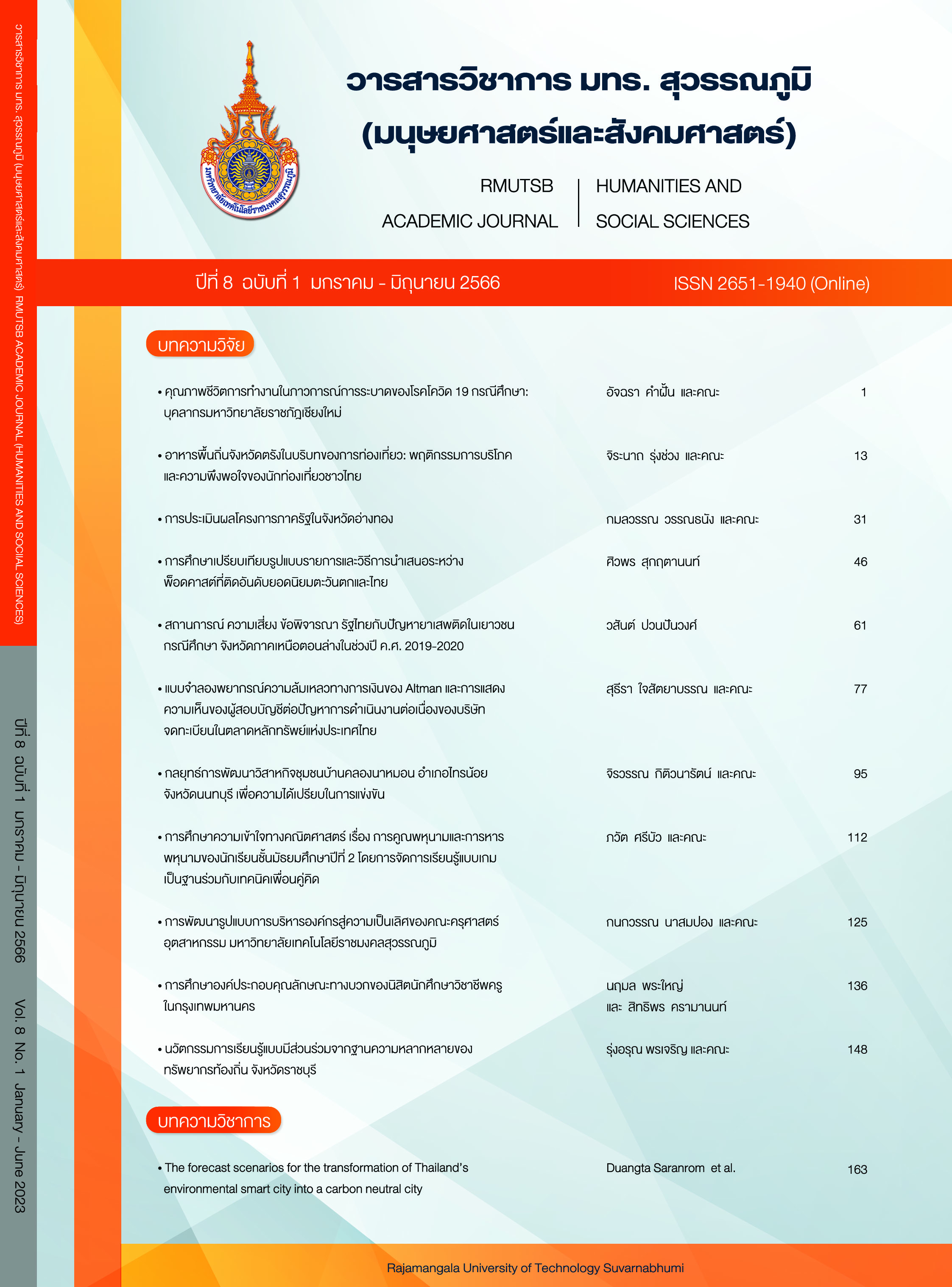The forecast scenarios for the transformation of Thailand’s environmental smart city into a carbon neutral city
Main Article Content
Abstract
Carbon emissions reduction study is currently ongoing, which the government has begun to focus on, and the government has committed to the world community to decrease carbon emissions to be carbon neutral by 2050 and net zero by 2065. Therefore, this article studies the prediction scenario of creating an environmental smart city into a carbon neutral city in Thailand. The objective is to examine environmental smart city development predictions to carbon neutral cities by modeling carbon neutral urbanization projections in four scenarios separated into three sectors: the home sector, the industrial sector, and the transportation sector. The four scenarios are as follow. 1: There is no support from the government. As a result, it is unable to exceed the government's emissions targets. Thus, enormous quantities of carbon credits must be acquired to offset greenhouse gas emissions. Scenario 2: There is a consensual campaign to reduce carbon dioxide emissions. As a result, the operation will be a non-investment measure that requires the purchase of a huge amount of carbon credits to offset greenhouse gas emissions. Scenario 3: The government sector has a strategy that helps, resulting in better interdependence in various areas. There are several programs underway to mitigate carbon dioxide emissions and reduce carbon expenditures. Scenario 4: The government's declaration of mandatory rules has resulted in concrete action, and there are more schemes to compensate greenhouse gas emissions. Long term plans encompass both public and private carbon credit trading. The recommendations for the development of smart cities about being carbon neutral cities are comprised of four major aspects based on the results of the four scenarios: 1) technology selection for renewable energy 2) improvement of efficiency and energy conservation 3) waste management, and 4) a scheme to reduce greenhouse gas emissions.
Article Details

This work is licensed under a Creative Commons Attribution-NonCommercial-NoDerivatives 4.0 International License.
References
Das, D. (2019). Smart city. Retrieved 19 June 2021, from https://www.researchgate.net/profile/Diganta-Das/publication/332425909_Smart_City/links/5ce7a726299bf14d95b536df/Smart-City.pdf
DEDE. (2022). Energy consumption in Thailand. Retrieved 13 June 2021, from https://weben.dede.go.th/webmax/content/dede-says-overall-alternative-energy-usage-reaches-11
Fu-Chun, M. C. F. (2021). Accelerating towards net zero emissions: the most important global health intervention. The Lancet Planetary Health, 5(2), e64-e65.
GSMA. (2022). Smart city: Environment. Retrieved 10 June 2021, from https://www.gsma.com/iot/smart-cities-resources/smart-cities-environment/
IEA (2022). World energy investment 2022. Retrieved 22 January 2023, from https://iea.blob.core.windows.net/assets/b0beda65-8a1d-46ae-87a2-f95947ec2714/WorldEnergyInvestment2022.pdf
IPCC. (2020). Global timeline to reach net-zero emission. Retrieved 19 June 2021, from https://www.undp.org/turkiye/news/climate-change-widespread-rapid-and-intensifying-ipcc?c_src=CENTRAL&c_src2=GSR
Mazzucato, M., McPherson, M., & Hill, D. (2019). A mission-oriented approach to clean growth. Retrieved 29 January 2023, from https://www.researchgate.net/figure/Mission-Roadmap-for-100-Carbon-Neutral-Cities-By-2030-designed-for-the-European_fig1_353466785/download
Tawichsri, T. (2021). Carbon neutrality. Retrieved 4 March 2021, from https://www.pier.or.th/blog/2022/0301/
TGO. (2021). Carbon emission in Thailand. Retrieved 11 June 2021, from http://thaicarbonlabel.tgo.or.th/index.php?lang=EN&mod=YjNKbllXNXBlbUYwYVc5dVgybHo
UN Global Compact. (2021). Thailand's long-term greenhouse gas emission development strategy. Retrieved 14 June 2021, from https://globalcompact-th.com/news/detail/602


